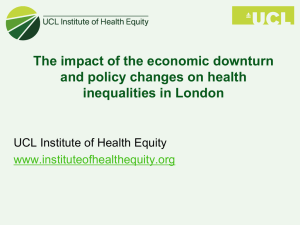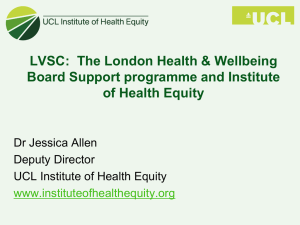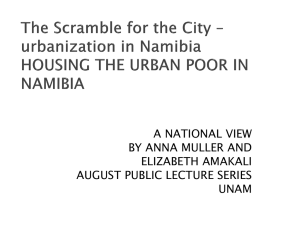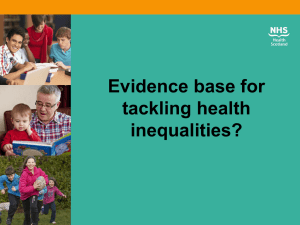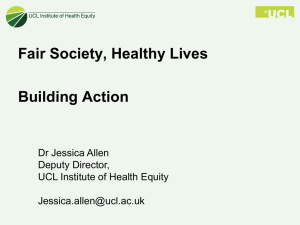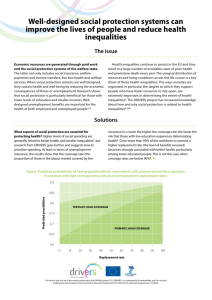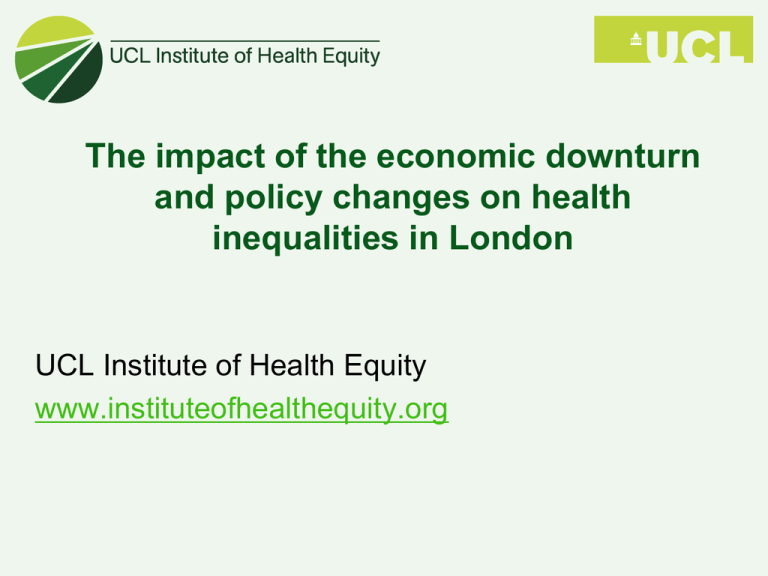
The impact of the economic downturn
and policy changes on health
inequalities in London
UCL Institute of Health Equity
www.instituteofhealthequity.org
• Commissioned by the London Health
Inequalities Network.
•
“To assist local authorities in London to identify and mitigate
negative impacts of the economic downturn and welfare
reforms on health inequalities and the social determinants of
health to 2016, particularly employment, income and housing
impacts, by providing the following:
•
•
•
Literature review on the likely impacts.
Some recommendations regarding what local authorities could do
to minimise any negative effects.
A set of indicators that local authorities should use to monitor the
impact of the changes – in development.”
London has large inequalities in mortality and health
Action to reduce health inequalities needs to focus
on the social determinants of health
Evidence from previous economic downturns
suggests that population health will be affected:
•
•
•
•
•
•
More suicides and attempted suicides; possibly more
homicides and domestic violence
Fewer road traffic fatalities
An increase in mental health problems, including
depression and possibly lower levels of wellbeing
Worse infectious disease outcomes such as TB +
HIV
Negative longer-term mortality effects
Health inequalities are likely to widen
The report specifically looks at the impact of the
recession on income, employment and housing:
• The economic downturn is causing a rise in
unemployment, a fall in income for many households,
which in turn may cause housing problems for those who
experience lower incomes.
• Unemployment, low incomes and poor housing contribute
to worse health.
• These problems are more likely to occur among particular
groups within the population and among those already on
low incomes.
Employment
• Unemployment is bad for health and can have long-term
impacts, particularly for those who experience long-term or
early unemployment
– London unemployment up from 6.7% (Q2 2008) to 10.1% (Q1 2012)
– More deprived areas in London have higher proportions of young people
who are NEET
• Self-rated health can be worse in an economic downturn for
those who stay in work
– higher levels of job security anxiety, bigger work demands, financial
problems resulting from pay constraints, lack of control over work situation
– Increased competition for jobs may drive down wages and working
conditions
– Employers may be less likely to prioritise work-life balance, flexible working
and diversity initiatives
– Fall in equal pay and sex discrimination claims recently – fear of job loss?
• Many of those in poverty live in working families. Receiving
a ‘living wage’ will support their chances of remaining
above the poverty threshold and receiving the ‘minimum
income for healthy living’
Impact of the welfare reforms
• £18 billions welfare savings
• Intended to strengthen incentives to work, but there is a shortage of jobs.
• Many households face reduced benefits – lower incomes, harder to cover
housing costs.
• Affects low-income households, in particular: workless households; households
in more than 16 hours per week of low-paid work; lone parents; households with children;
larger families; some ethnic minority households; disabled people reassessed as ineligible
for new benefit; private rented tenants.
• Households unable to afford current accommodation will need to find an
alternative solution, eg. Become employed, re-negotiate rent, go into rent arrears
(leading to repossession or non-renewal of tenancy), become homeless, become
overcrowded, compromise on housing conditions, move to a less expensive area of the
capital or out of London.
• London should expect significant migration within and between boroughs
as more areas become unaffordable.
• Likely widening of socioeconomic health inequalities.
Recommendations
1. Assess and respond to area needs
–
–
Local measurement and monitoring
Cross-sector working
2. Ensure sufficient incomes
–
–
–
Strengthen financial incentives to work
Sufficient income: Employers should pay a living wage that
ensures a minimum income for healthy living
Good quality and affordable childcare
3. Ensure sufficient and affordable housing
4. Ensure an adequate supply of good jobs
–
–
Stimulate employment
Encourage ‘good’ work: “Jobs must be sustainable and offer a
minimum level of quality, to include not only a decent living wage,
but also opportunities for in-work development, the flexibility to
enable people to balance work and family life, and protection from
adverse working conditions that can damage health”
5. Sufficient provision of services to cope with likely
issues
• NATIONAL MEASURES inc. Health equity impact
assessments of all policies and Active Labour
Market Programmes
Institute website:
www.instituteofhealthequity.org
Full report:
http://www.instituteofhealthequity.org/Co
ntent/FileManager/pdf/london-full-repmedium-res.pdf

